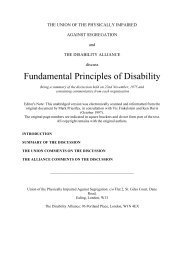Global-Report-Living-Colour-dr2-2
Global-Report-Living-Colour-dr2-2
Global-Report-Living-Colour-dr2-2
You also want an ePaper? Increase the reach of your titles
YUMPU automatically turns print PDFs into web optimized ePapers that Google loves.
68<br />
Inclusive Communities = Stronger Communities<br />
GLOBAL REPORT ON ARTICLE 19: THE RIGHT TO LIVE AND BE INCLUDED IN THE COMMUNITY<br />
where people with intellectual disabilities live, one<br />
hundred percent of our members who responded to the<br />
country survey indicated that the vast majority of people<br />
with intellectual disabilities in their countries live at home<br />
with their families.<br />
While access to formal services for people with intellectual<br />
disabilities vary across regions and countries, the primary<br />
source of support that people with intellectual disabilities<br />
receive wherever they live in the world is from their<br />
families. Yet families consistently reported that they receive<br />
little or no assistance (financial support, services,<br />
information or planning support). This means we need to<br />
understand both the individual’s need for services and<br />
supports at home in the community but also we need to<br />
understand the needs of the family in fulfilling their role as<br />
caregivers, advocates and as the economic and social link<br />
to the community.<br />
Supports to the Individual<br />
For people with intellectual disabilities the kinds of<br />
supports and services which they need to function and<br />
participate in their communities vary greatly across<br />
cultures and regions and by the nature of support the<br />
individual wants and needs. For our purposes we refer to<br />
disability related services, financial assistance, information<br />
and planning provided or funded by governments as<br />
formal supports and unpaid assistance provided by<br />
families, neighbors, friends and others in the community<br />
as informal supports.<br />
Supports may be focused on the person with an<br />
intellectual disabilities, or on the family or both. They can<br />
include assistive devices and physical aids but more often<br />
they are assistance with personal care, support in<br />
education or employment, support in decision making or<br />
support in housekeeping, preparing meals or managing<br />
finances. The type and availability of services and supports



